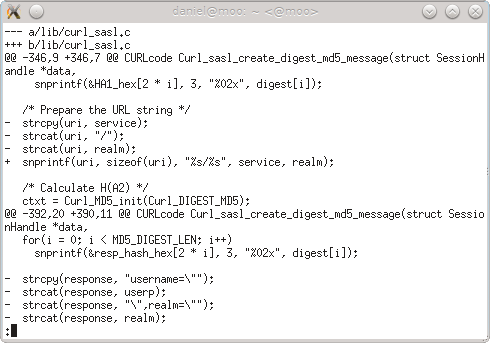In the end of January 2013 we got a fresh security vulnerability pointed out to us in the curl project (it was publicly announced on Feb 6). Another buffer overflow. This time in the SASL Digest-MD5 handling for POP3, IMAP and SMTP. It is the 16th security flaw during curl’s life-time of almost 15 years so it isn’t a disaster but still of course it is never fun when it happens. I put a lot of my own effort and pride into this project so every time something like this floats to the surface my pride and self-esteem get damaged a bit.
Everyone who’s concerned about open source and security and foremost in a reliable and secure libcurl of course now wonders: how did this happen? How could this piece of security problem get into libcurl and what are we doing to make sure it doesn’t happen again?
Let me tell you the story. It is not as interesting nor full of conspiracies as you’d like. It is instead rather dull and boring but nevertheless the truth.
I’m the lead developer and maintainer of curl and libcurl. I personally have done some 65% of all commits in the project and I do the majority of all code reviews on the mailing list. Our code might be used by some 500 million users, but the number of regulars that can be considered the “core team” can still basically be counted on a single hand. Also, we all do this primarily on our spare time.
During intense development periods we get flooded by bug reports and patch submissions and my backlog grows. It’s really not possible to foresee when these periods come, but occasionally it seems the planets align in this way and work piles up.
In order to then proceed the best way in the project, I try to focus on the architectural and “deep” matters that need me and my particular knowledge most. I then try to leave the “easy” problems that are easier to work on to others, and I try to stay away from the issues that already seem to be under control by some of the existing regulars in the project. I also have to let other “elders” in the project push things with slightly less scrutiny just to be able to plow through the work better. Unfortunately this leads to the occasional flaw getting through and in this case it was even a security vulnerability that when you look back on the code you really cannot understand how we could miss this.
We do take security seriously though and we make a big effort on handling all security reports swiftly and accurately. Even if this was the 16th time we let our guard down, I want to think that we at least react responsibly and in a good way when we realize our mistakes.
Please don’t judge us due to this. Please instead consider joining us and help us review code and help us find the next flaw before we merge it into mainline or at least before we do a public release with the code!

